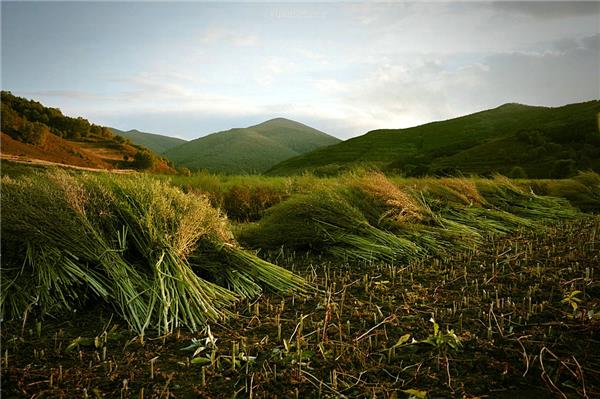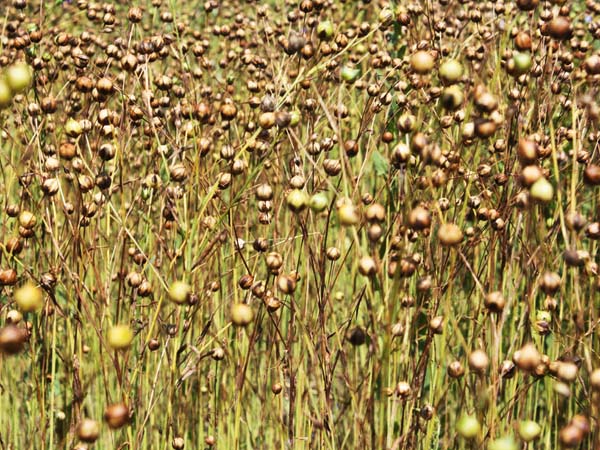The planting technique of flax what is the function of flax
Flax is a very versatile plant, which can not only be used as grain and oil, but also has very high medicinal value. Let's take a look at flax before it is made into oil.

I. the medicinal effect of flax
1. I have a pain in my waist and feet. Use a liter of new flax, boil it and mash it. Swallow the right amount daily and send it down with ginger juice, honey soup and warm wine.
two。 The hands and feet are sore and slightly swollen. Boil with flax, study strongly, take five liters and one liter of wine, soak for one night and drink freely.
3. I feel a chill. Stir-fry it with flax and drink it with hot pounded sparkling wine. After drinking, it is better to lie warm and sweat slightly.
4. Hot shower. Use flax seed and vine jingzi, stir-fry yellow, bag, soak in three liters of water, take one money before each meal.
5. Swollen and malignant sores. With flax (ash), needle sand, equally divided into the end, add vinegar to adjust the affected area.
6. The scabies of the sitting plate. Apply with raw flax.
7. Soup fire wound. Use flax to grind into the mud and apply to the wound.
8. My eyebrows are not long. Dry the flax flower in the shade, grind it to the end, and wipe the eyebrows every day in the sesame oil.

Second, fertilization and drought-resistant flax cultivation techniques in autumn
1. Deep ploughing in autumn and deep ploughing is carried out before and after harvest, and rain is accepted in autumn. Rake and suppress soil before freezing in winter, avoid fertilization and tillage in spring, and prevent soil moisture loss.
two。 Fertilization in autumn is combined with soil preparation in autumn, according to 2000-3000 kg of organic fertilizer, 10-12 kg of urea and 20-25 kg of superphosphate per mu; fertilizer can also be spread on the surface of the ground, ploughed into the soil, so that the soil fertilizer is fully mixed, and then raked flat and ground fine.
3. Sowing in spring avoids tillage, and sows directly after the average temperature stably passes through 5 ℃. It can be broadcast live with a flax burrow seeder, or it can be sowed with a seeder or an animal power seeder. Rake in time after sowing to prevent the soil from running away from moisture. The row spacing is 15 to 20 meters, and the sowing depth is 2 to 3 meters. The sowing rate is about 3 kg / mu and the seedling protection is 200000 ~ 250000 plants / mu. Proper early sowing can effectively use soil water to store water and improve seedling emergence rate and drought resistance.
4. Grass damage prevention and control according to the damage of weeds in the field, timely prevention and control. Artificial weeding can be carried out when weeds are scarce. When weeds are dense, you can use 20% to clean 200kg 300g plus 70% dimethyltetrachloride 50 ~ 70g to spray 30kg 40kg of water for chemical control.
5. Timely harvest flax lower leaves yellowing, part of the leaves fall off, 50% 60% capsule yellowing can be harvested.

III. Pest control
1. Good varieties with disease resistance (tolerance) were selected for agricultural control, rational variety layout, crop rotation, soil testing and balanced fertilization, increased application of phosphorus and potassium fertilizer, appropriate amount of chemical fertilizer, strengthening mid-tillage, cleaning the countryside, reducing the number of disease and insect sources, and dealing with the disease center in time.
two。 Biological control protection uses seven-star ladybug, aphid fly, grass bell and other natural enemies to control aphids, create an environment conducive to the survival of natural enemies, and choose pesticides with low lethality to natural enemies.
3. According to the biological characteristics of insect pests, sugar ∶ vinegar ∶ wine ∶ water ratio of 1 ∶ 4 ∶ 1 ∶ 16 or solar energy insecticidal lamp 30 / hm2 was selected to trap and kill armyworm and other pests.
4. Chemical control
① oil spill insect, armyworm and black velvet beetle were sprayed with 2.5% phoxim EC 300mL/hm2 for 2 times and the safety interval was 7 days, or 50% phoxim EC 750ml/hm2 was used to spray water 750kg for 1 time and 2 times, and the safety interval was 20 days.
② aphids were treated with 50% aldicarb wettable powder (150~450g/hm2) with a safe interval of 11 days.
③ golden needle beetle, ground tiger and grub were mixed with 1000 times 90% trichlorfon EC 375g and fried oil residue 75g 120 kg, then were spread in the sowing ditch to trap and kill. The safe interval was 7 days.
④ Rhizoctonia solani, anthracnose and powdery mildew were sprayed with 75% methyl topiramate wettable powder 750~1125g/hm2 on water 600 kg twice with a safety interval of 7 days, or with a safe interval of 3 times with a safe interval of 3 times and a safe interval of 4 days with a liquid of 1000 to 2000 times 64% alum wettable powder 750-1500g EC 750mL spray to control powdery mildew.

Do we now have a deeper understanding of flax, and do we all have a clearer understanding of this plant before it was made into flax oil? If you or your relatives and friends are growing flax, I hope the above introduction can help you.
Related
- Wuhan Hospital Iron Tree Blooming Result Was Instantly Frightened by the Gardener Master
- Which variety of camellia is the most fragrant and best? Which one do you like best?
- What is the small blue coat, the breeding methods and matters needing attention of the succulent plant
- Dormancy time and maintenance management of succulent plants during dormancy
- Minas succulent how to raise, Minas succulent plant pictures
- What are the varieties of winter succulent plants
- How to raise succulent plants in twelve rolls? let's take a look at some experience of breeding twelve rolls.
- Attention should be paid to water control for succulent plants during dormant period (winter and summer)
- Watering experience of twelve rolls of succulent plants
- Techniques for fertilizing succulent plants. An article will let you know how to fertilize succulent plants.



